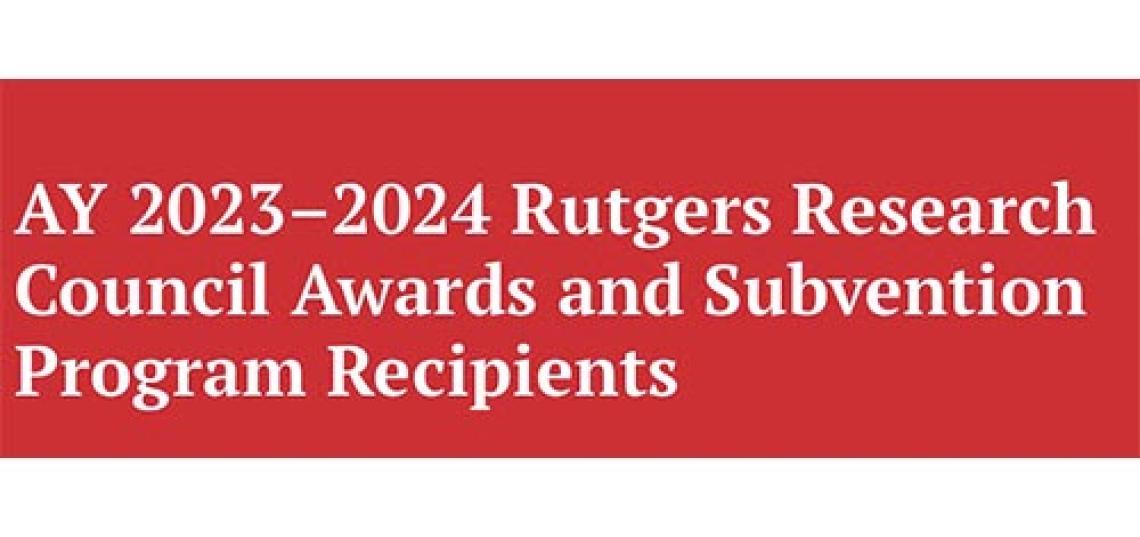
The Office of the Executive Vice President for Academic Affairs, Rutgers University, has announced the recipients of the 2023-2024 Research Council Awards. Three SC&I faculty members, David Greenberg, Sunyoung Kim, and Youngrim Kim have been named award recipients.
“The Rutgers Research Council Awards and Subvention Program offers grant opportunities to support faculty research and especially to encourage scholarship in tackling challenging disciplinary problems in the sciences, social sciences, humanities, and creative arts,” according to the university.
Professor of Journalism and Media Studies and of History David Greenberg was awarded funding from the Research on Social and Racial Justice Awards Program for his project “John Lewis: From Protest to Politics.” According to the university, this funding program was “inspired by President Holloway’s Equity Report and the University’s commitment to fostering excellence in and as a beloved community, supports academic research on racial and social justice in all domains of intellectual, social, artistic, and environmental life.”
Associate Professor of Library and Information Science Sunyoung Kim received funding from the Collaborative Multidisciplinary Awards Program as a collaborator on the project “Feasibility and Effects of Behavioral Interventions to Reduce Problematic Smartphone Use with College Students: A Stage 1 Randomized Controlled Trial.”
This awards program, the university wrote, “offers the opportunity for a group of faculty members across disciplines to work together on a new, shared problem or line of research. Since complex intellectual and social problems often require multiple perspectives and viewpoints to solve them, the program is designed to foster and reward creative and collaborative interdisciplinary work.”
Assistant Professor of Journalism and Media Studies Youngrim Kim received a Manuscript Review Award to help support her work on her book, “Databasing Latent Bodies: Disease Surveillance, Data Publics, and Coded Injustice in South Korea.”
This award, according to Academic Affairs, “is designed to help faculty members publish authoritative, thought-provoking, field-changing books. The award reinforces the university’s commitment to research and scholarship. Awards include a formal manuscript review plus a three-hour workshop / seminar led by an external senior scholar.”
David Greenberg is a historian of American political and cultural history. He writes about history, politics, and media for a variety of scholarly and popular publications. He is the author of "Republic of Spin: An Inside History of the American Presidency" (2016); "Nixon’s Shadow: The History of an Image" (2003); and "Calvin Coolidge" (2006). He is a frequent commentator in the national news media on contemporary politics and public affairs. He is currently writing a biography of Rep. John Lewis, the civil rights leader.
Sunyoung Kim is interested in improving the quality of everyday life through the use of technology. Leveraging mobile and ubiquitous computing technologies, she explores novel technical solutions that empower people to better understand the world around them and make informed choices for quality of life. She is also an affiliate faculty member in the Department of Computer Science.
Youngrim Kim studies the role of digital platforms and data-driven systems in relation to state institutions and governance. She examines how state institutions build and utilize digital technologies to manage complex governance challenges, especially in cases of imminent public health or environmental crises.
Her current book project, “Databasing Latent Bodies: Disease Surveillance, Data Publics, and Coded Injustice in South Korea” critically examines South Korea’s data-driven governance of public health crisis through the cases of two infectious disease outbreaks – 2015 MERS epidemic and COVID-19. Drawing from 16 months of ethnographic fieldwork in Seoul, South Korea, her project illustrates how these crisis response technologies should be considered as contested sites of nation-building where different ideas about citizenship, belonging, and national futures are negotiated.
Learn more about the Rutgers School of Communication and Information on the website.
